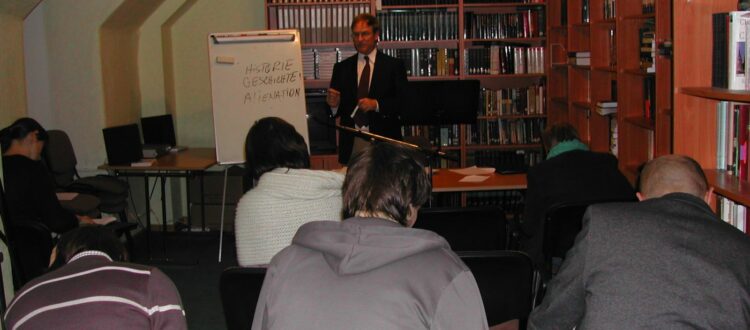Teaching, Preaching In Spiritually Needy Latvia
As a member of the board of directors of International Theological Education Ministries, I was asked to go to Riga, Latvia, to teach at Baltic Reformed Theological Seminary in the city.
I left Charlotte at 1:15 p.m. Feb. 15, flew to Philadelphia and then to Frankfurt, Germany.
Looking out the window as the jet descended into Riga, I could see the massive Baltic Sea and what looked like pristine wilderness and lots of snow.
I was surprised how easy it was to navigate around the airport in Riga as it was much smaller than I thought it would be for an airport which services a city of about one million. A young bearded man, Janis (pronounced yanus) Perkons, whom I had never met in person but we had written to one another several emails, met me and took me to Hotel Laine which is in the heart of the city.
After resting for an hour, the president of the Seminary, Artis Celmins, met me and took me to lunch and afterwards showed me Baltic Reformed Seminary.
Both men spoke nearly perfect English, though through a strong Eastern European accent.
The school is small, but that is to be expected in a country where essentially Christianity is not seen as a significant part of people’s daily lives or worldview.
However, I was impressed with their use of technology, making it possible for students in nearby Lithuania to view the lectures in their own language.
After some great conversation, a fine meal, and sightseeing, I was driven back to the hotel and was very happy to get a good night’s rest, though the bed was not very comfortable.
The next day was Sunday, and it seemed a little unusual that I was not getting ready to preach, but I looked forward to hearing someone else. The breakfast at the hotel was wonderful, a variety of breads, pancakes, juices, and yogurt. Latvians love their coffee strong, so I felt right at home.
Before the church service, I saw Freedom Tower, a statue of a woman holding three stars which continue to hold great symbolism for the Latvians.
The structure was built in the early 1930s, but the Communists during their decades of control, allowed the statue to stand.
As I gazed at the huge structure, I was reminded of how precious freedom is in every human heart— whether it is political or religious.
Not far away a statue of Lenin was torn down in 1992.
The architecture in Riga is majestic — parts are breath taking in their beauty, much of it having been built by Germans and Swedes.
Ornate figures are engraved in most buildings. The best view of the city is in the high tower of St. Peter’s Lutheran Church where one can see a gorgeous panoramic view of the city’s many bridges over the Daugava River as well as how massive the city is. But not all buildings are remembered with gratitude — especially the building of the Ministry of Internal Affairs of Justice.
Here for many years, select Latvians who were suspected of insurrection against the Communist government were interrogated and worse.
Latvia has a long history of being controlled by other nations such as Sweden, Russia, and Germany.
Riga especially was severely bombed by the Germans during World War II.
The students, staff of the Seminary, and pastors shared with me poignant accounts of family members who had been persecuted by the KGB even in the late 1980s. Some were sent to camps in Siberia never to return or be heard of again.
The church I attended at the 4 p.m. service was Riga Reformed Bible Church, not too far from the hotel. The message was translated into English for me; the sermon was on the Beatitudes, and I found the message helpful.
Each day, my class met from 6 to 9 p.m.
Keeping in mind that Latvia is a post-communist country and in a sense post-Christian too, I was excited that my class consisted of 12 students, primarily in their 30s and 40s.
The students all have a strong commitment to Christ and His church, especially in the Baltic countries.
I also had a fifteen minute sermon each evening before the lecture. About half of the students understood English; therefore, my lectures were translated into Latvian immediately. The students all had headphones making it possible for the interpreter to give the message in their own language almost simultaneously. They all took copious notes.
Young people especially see religion as irrelevant. More mature people may have been baptized in either the Eastern Orthodox Church or the Lutheran Church, but they are rarely involved with matters pertaining to the church.
Some have decided to accept the pre-Christian teachings which were in the Nordic countries before the Christian message was brought hundreds of years ago.
About 35 percent of those living in Riga are Russian. The Latvians identify more with Scandinavians, especially Swedes and Norwegians; there is underlying resentment on the part of many Latvians against Russians since they occupied Riga for generations.
I was told several times that Latvians do not protest outwardly if they disagree with political issues. Perhaps one reason for this is that they have been used by other nations over the past few centuries and have not been accustomed to self-ruling.
My daily three-hour class sessions on Christian theology went well; students were attentive and very polite.
Latvians are reserved, and I had to be creative to engage them in class. We would take a break after an hour and a half; they love tea and /or coffee and to engage one another in intense conversation. Rarely have I seen students who were so engaged in the subject of the week.
For those who are interested in sharing the Gospel, Latvia is one of the most spiritually needy locations in Europe.
The country leads Europe in alcoholism, and the divorce rate is very high.
Latvian is a difficult language, unrelated to any other, but it is spoken as either the first or second language of Latvia’s 2.5 million inhabitants.
I am grateful for the time in Riga.
The city has been called the “Vienna of the North”, and after being there, I can understand why. I hope to return again this year.

